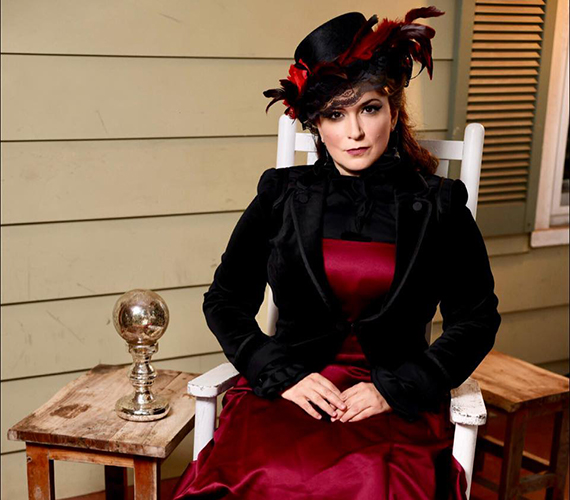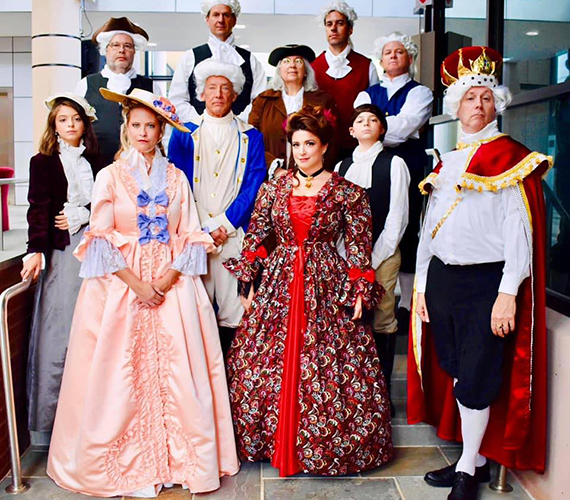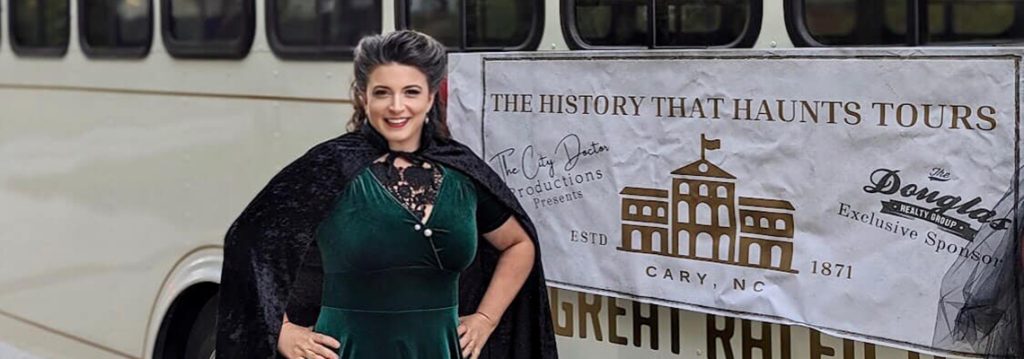School of Social Work alum helps cities build bonds with community members
by Matthew Smith; photos provided by Katherine Loflin
“I think I’ve gone a little further afield from our traditional view of social work.”
The observation from University of North Carolina at Chapel Hill School of Social Work alum Katherine Loflin is not wrong.
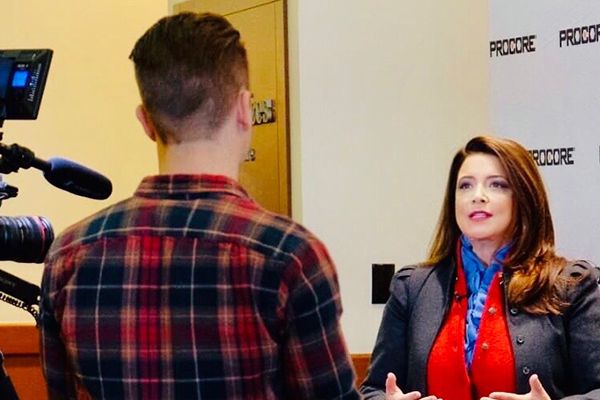
However, the two-time School of Social Work graduate is changing the way people view the places they live, using the tools and techniques she learned from the School to help cities build enduring bonds with the people that make up their communities.
Great place to start
Loflin’s journey to UNC began at the behest of her supervisor after earning her undergraduate degree in psychology.
“I wanted to go into clinical psychology,” Loflin said. “I was working as a court representative for domestic violence cases and was considering graduate school. My supervisor suggested I look into social work as opposed to clinical psychology.
“I remember he said, ‘This may not make sense to you now, but it will. Social work focuses on the person and environment. Psychology focuses on within. I think you’ll be happier there.’”
Loflin, who earned her master’s in 1996 and her doctorate in 2003, found her place in social work by focusing on environment, particularly how community members bond with the places they live.
She became an expert on placemaking — the way places design community spaces to improve happiness, health and well-being — earning the title “The City Doctor” for her more than 15 years of global work with cities and businesses.
“Placemaking focuses on people’s relationship with their larger environment and how we can design spaces and communities in such a way that helps them develop emotional bonds to their place,” Loflin said. “The metric we look at is attachment to a place.
“Previously, the field didn’t have a measurement model for emotional attachment to a place and why it mattered. When my work started to be published, people in the placemaking field came to me and said, ‘OK, you just changed our whole discipline.’”
Place for social work
Placemaking may seem like more of a community or regional planning tool than a branch of social work, but Loflin has been able to apply the models she learned during her master’s and doctoral programs to help communities thrive.
“I give a lot of credit to social work,” Loflin said. “I come into every project using a strengths-based model. We always start with what cities are getting right when it comes to their communities.
“By leading with what communities are doing well and helping them identify where opportunities can still be found, you’d be amazed at how you can get people to lean into the work versus telling them how to do things themselves.”
Working with the community is critical. Not every place wants the same thing; determining where a place derives its pride and bolstering those qualities is vital to the work Loflin does.
“We sometimes assume that a smaller community would love a big business moving in,” Loflin said. “That it would be a big source of pride for them. But you’re not giving them credit about where their sense of pride comes from.
“I’ve worked everywhere — from across the country to Australia to Sweden to France and Canada — and one thing holds true. You have to let places be who they are. You have to optimize their current narrative and promote what they do well.”
Loflin’s book, “Place Match: The City Doctor’s Guide to Finding Where You Belong,” uses her background in marriage and family counseling to explore how bonding with your community is similar to bonding with your partner.
“Many of things we look for in a partner are the same things we look for in our communities,” Loflin said. “I look at three major things: social offerings, openness and aesthetics. We need someone that’s fun to be around; someone that accepts us; and someone that’s attractive to look at.”
“Or at least tolerable on the eyes,” she joked. “But really, if you find those three qualities in a partner, it’s a good bet your relationship will work out. We need those same things from our communities.”
Place your bets
Communities are placing their bets on Loflin’s work. Her macro approach to social work is helping cities and businesses better connect with the people they serve.
“In the 17 years that I’ve been doing this, we’ve found that community attachment is related to lower school dropout rates, improved public health seeking behaviors, reduced isolation, and less crime. The local economic growth benefit may be the strongest one for businesses and policymakers, but as a social worker, there are so many other positive public health and community outcomes that we’ve tracked.”
— Katherine Loflin, UNC School of Social Work alum
“What we’ve been able to show with the data is that the more people are in love with where they live, the more the place grows economically,” she said. “People stay in the communities they love, they buy homes, they open businesses, they plant their roots.”
Loflin added that historically disadvantaged communities also make an impact despite some of the economic barriers they face.
“When disadvantaged communities develop that sense of attachment, they still make a big impact,” Loflin said. “They often hold the history of the place. They have been there for generations. They truly love the place like family. They invite people to come spend time with them, contributing to the economy instead of somewhere else. Attachment pays dividends in both small ways and big ways.”Shay Barker, a former economic development officer in Airdrie, Canada, said Loflin’s work was as engaging as any she’s seen. Loflin helped Airdrie leadership develop its 10-year (2018-28) economic development strategy with placemaking in mind.
“I have never seen (our city’s) staff so engaged in a speaker before and am so proud of the discussions that were had and continue to be had by our organization,” Barker said. “Dr. Loflin truly helped to create an environment where we as city staff can better define how our work is connected to why residents choose to live in, and love Airdrie.”
While the economic benefits of placemaking may be the strongest to come from the planning approach, from a social worker’s view, there are many more.
“In the 17 years that I’ve been doing this, we’ve found that community attachment is related to lower school dropout rates, improved public health seeking behaviors, reduced isolation, and less crime,” Loflin said. “The local economic growth benefit may be the strongest one for businesses and policymakers, but as a social worker, there are so many other positive public health and community outcomes that we’ve tracked.”
Loflin’s work has attracted a wide range of followers from different disciplines. She is the first to take the TEDx stage — twice — to talk about the power of place and place attachment.
Successful places
Loflin highlights successful examples of placemaking through her public speaking engagements and expert interviews. Two stand out — one hundreds of miles up north and another closer to home.
She recounted a project in Buffalo, N.Y., that involved one man, a few buckets of paint, and a group of Adirondack chairs.
“Buffalo’s waterfront featured a lot of industrial companies,” Loflin said. “When they left, the area looked decayed; no one wanted to go to it.
“One guy decided to invest a few hundred dollars and put out painted chairs. It worked; a newspaper covered his effort. He painted them out on the waterfront, so he was visible. People started showing up. Pretty quickly, the waterfront became a destination of the city. It shows me that little ideas make a big difference. Anyone can think differently about a place and make it transformative.”
Back in Cary, Loflin is making a difference locally through her company The City Doctor Productions.
Her latest passion began five years ago when she became involved in local theatre. That led her to appearing in a play in nearby Holly Springs written by a friend that chronicled the history of the town.
Loflin was hooked.
“I have never seen a sea of people so affected before in my life,” Loflin said. “People were crying and hugging. It was unbelievable how moved people were. I thought, ‘There’s something going on here. What if I added principles of place attachment to this model?’”
Loflin became more involved in the local history of Cary, where she currently lives, joining the local historical society, being appointed the Historic Preservation Commission, and becoming more knowledgeable about the town’s history.
“There’s a lot of history,” she said. “Revolutionary war spies, moonshiner shootouts, the state’s first public high school.”
Loflin began writing a play based around Cary’s history that debuted around the town’s 150-year celebration.
From there, the local history productions grew and with it so did the opportunities. She became an executive producer with ABC Network and her award-winning company, The City Doctor Productions, now offers theatric productions that bring local history to life ranging from historic tours, shows and paranormal investigations at historic locations. Her second book, “The Hidden History of Cary,” will be released later this year.
“I have never seen anything significantly create greater attachment in a shorter amount of time than an innovative, creatively done local history production that tells the story of a place in an engaging way,” she said. “It moves people quicker than anything. Plus it allows me to innovative local tourism models with place attachment principles.”
Gary Bowen, former dean of the School, said Loflin’s work is “extremely novel” and is a creative example of social intervention at the macro level.
“I recently had an opportunity to take part in one of Katherine’s placemaking events in Cary which involved boarding a trolley car with fellow residents and going to different locations in downtown for historical re-enactments of pre- and post-civil war events,” Bowen said. “It was a wonderful, immersive theatrical experience with opportunities for interaction with fellow participants. I truly felt greater connection and solidarity to Cary and its residents by the end of the evening — the community in which I reside.
“Katherine work is an excellent example of how our Ph.D. graduates are expanding on the knowledge and skills they acquired in their doctoral program to change the world in a positive way.”
A place for others
As Loflin turns her focus toward her productions in Cary, she has advice for others looking to get more involved in their communities.
“I don’t believe that you have to attend every council meeting or picket the streets to make a difference,” Loflin said. “For some folks, that’s their go to and they are successful at it. But there are simple things everyone can do. Go out and find the things you love about your community. Our communities are so diverse and have so much to offer that really there is something there for everybody; you just have to find out what that is.
“If you see an issue, ask yourself ‘What is the simplest solution?’ You could be the one to change the game on that.”
Loflin’s work may be a little outside of the norm of a traditional social worker, but she believes what she learned at UNC continues to play a big role in her work that has changed the lives of millions of people worldwide.
“The School and my professors didn’t always know what to do with me,” Loflin said. “But, I’m grateful they’re proud of me.”
Learn more about Loflin and The City Doctor Productions online.
Related stories
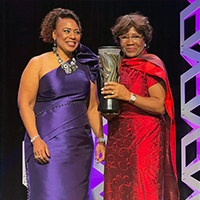
“What are you doing with your gift?”
UNC School of Social Work board member Deloris Jordan accepted the Coretta Scott King Soul of the Nation Award on Saturday, Jan. 13, 2024.
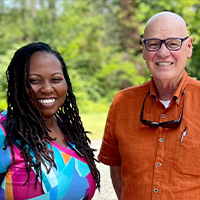
Alumna helps create Child Advocacy Center to ensure survivors receive services
During the last few years of Antoinetta Cash Royster’s 16-year-career with the Department of Social Services in Person County, many of her conversations with colleagues and community partners centered on one major topic.

